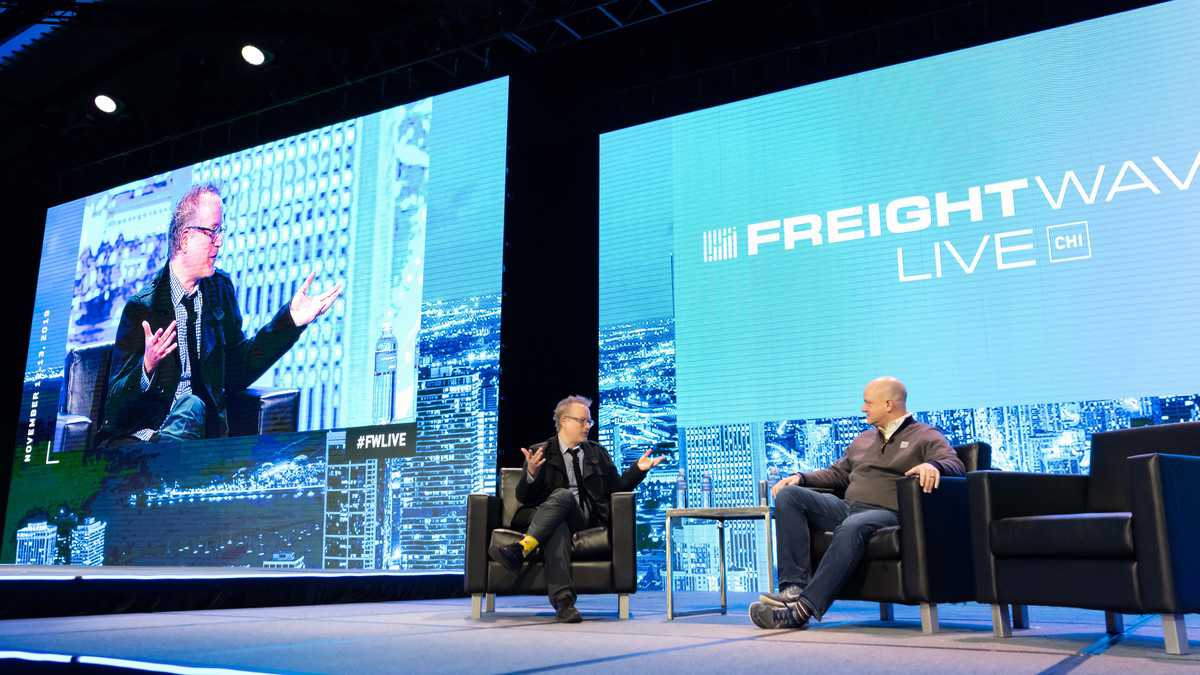Author Ben Mezrich, who wrote the story of Facebook’s co-founding that became the film “The Social Network”, thinks CEO Mark Zuckerberg needs to act as a publisher in policing truth in political ads on Facebook.
“Zuckerberg is hiding himself under the free speech thing to do things that none of us would really quantify as free speech,” Mezrich said after a keynote discussion with FreightWaves founder and CEO Craig Fuller at FreightWaves LIVE Chicago on Tuesday, Nov. 12.
The refusal of Facebook to vet the content of political ads on the site so incensed “Social Network” screenwriter Aaron Sorkin that he wrote an open letter to Zuckerberg that appeared as an op-ed in The New York Times on Oct. 31.
Sorkin appealed to Zuckerberg to use the same pursuit-of-truth standard that he applied to vetting the “Social Network” screenplay, which Facebook tried to shut down several times.
“Zuckerberg’s response is that he shouldn’t be the one to judge whether something is true or not,” Mezrich said. “But the reality is it’s a media company and a publisher. So a publisher does have to judge whether something is true or not if it is going to present it as true.”
Mezrich continued, “If they’re going to throw things at us as if they are a news story, it does have to be vetted as a news story. If they are going to throw a picture of a ball at us because they want us to buy a ball, it’s very different.”
Russia’s long game
Mezrich wrote a nonfiction account of the rise of Russian oligarchs and Vladimir Putin in 2015 before Russian election meddling in the 2016 presidential election became known. He stated that influencing the 2020 election is not Russia’s goal.

“If you look at Putin and the way Putin thinks about the world, he’s like a chess master,” Mezrich said.” He’s not thinking, ‘I’m going to take over the world tomorrow.’ It’s more like, ‘If we sow these seeds of disorder and disarray, where is it going to end?’ It’s a long view.”
Putin’s role as president for life gives him the ability to think decades ahead and to the past of the Cold War, Mezrich said.
“His battle is between the Soviet Union and America,” Mezrich said. “It goes back to the ’80s. Putin has said his greatest regret is that Russia is no longer the Soviet Union.”
Sidecar style
Mezrich’s approach to his subjects is to tell their story their way. When he wrote about Russian oligarchs, he told tales of murder and mayhem that characterized the 1990s in Russia, which he compared with the 1890s in America.
“I was the author going in as their buddy,” Mezrich said. “I was brought in to tell the story of the oligarchs through the eyes of the oligarchs. I wouldn’t write that book if they hadn’t approved what I was going to write,” he said of ”Once Upon a Time in Russia: The Rise of the Oligarchs and the Greatest Wealth in History.”
Mezrich’s approach to “Accidental Billionaires,” the basis of “The Social Network” was similar. He was approached about Eduardo Saverin, who co-founded Facebook with Zuckerberg. Saverin wanted to tell his story after being frozen out by Zuckerberg. Along the way, Mezrich met Cameron and Tyler Winklevoss, who had the idea for a Facebook-type social site that they accused Zuckerberg of stealing.
Zuckerberg refused to speak with Mezrich for the book because Saverin and the Winklevoss twins were involved. Mezrich said he eventually learned that Saverin was using his story as leverage to settle his beef with Facebook, which resulted in a $5 billion payout — and an agreement that Saverin no longer speak to Mezrich.
The Winklevosses settled for shares that made them billionaires when Facebook went public in 2012. They went on to become multibillionaires by investing in Bitcoin, which became Mezrich’s current book, “Bitcoin Billionaires.” Their company, Gemini, might have inspired Zuckerberg to call Facebook’s nascent cryptocurrency Libra, he said.
Mezrich’s first hit was the 2002 story of Massachusetts Institute of Technology math students who traveled to Las Vegas on weekends and counted cards to win millions at blackjack. Mezrich played alongside the MIT students while gathering information for the book that became the movie “21.”
“It’s fair to say I am the guy who rides along with the billionaire rather than the guy who takes down the billionaire,” Mezrich said. “I’m the guy who wants to tell your story the way you want to tell your story. Other people won’t like it, and other people may disagree with it, but that’s your story and you did all this, so let’s hear what you have to say.”











